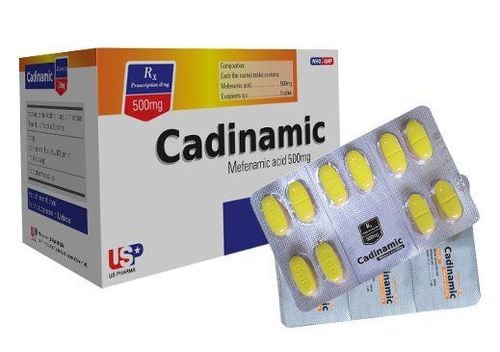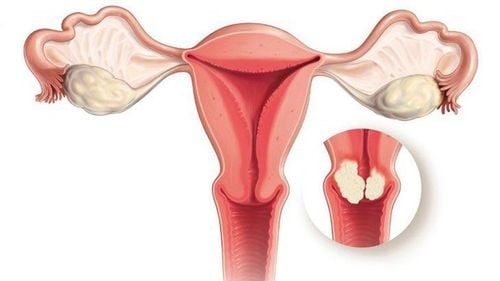This is an automatically translated article.
Amedolgic drug has the main ingredient is mefenamic acid and other excipients. Amedolgic is used to relieve neuropathic pain, headache, dysmenorrhea, hypogastric pain and pain due to trauma,...
1. What is Amedolgic?
Amedolgic belongs to the group of pain relievers, antipyretics, non-steroid anti-inflammatory drugs, treatment of Gout and bone and joint diseases. Amedolgic is prepared in the form of long film-coated tablets packaged in boxes of 10 blisters x 10 tablets.
Amedolgic drug has the main ingredient of 500mg mefenamic acid and other excipients included in the drug formula.
2. Indications for use of Amedolgic drugs
Amedolgic medicine is used in the following cases:
Relieves mild to moderate physical and neuropathic pain, migraine, headache, traumatic pain, toothache, back pain childbirth, postoperative pain, pain and fever following inflammation, spasmodic pain, or hypogastric pain. Treatment of dysmenorrhea, used for short periods (not exceeding 7 days) from mild to moderate pain. Also can be used for other cases as prescribed by the doctor.
3. Dosage and how to take Amedolgic
Amedolgic is to be taken orally, with food every 6 hours as needed for 1 week. Patients should strictly follow the doctor's instructions for taking the medicine, do not take more or less than the prescribed dose.
Dosage of Amedolgic refer to the following:
Usual dose: Use 250mg - 500mg/time x 3 times/day. The course of therapy with Amedolgic should not last more than 7 days.
4. Contraindications to the use of Amedolgic drugs
Amedolgic drug is contraindicated for use in the following cases:
Patients with impaired liver and kidney function. Patients with a history of allergy to any ingredient in Amedolgic. The patient has ever had a severe allergic reaction such as hives, rash, difficulty breathing, dizziness, ... to aspirin or a non-steroidal anti-inflammatory drug such as Celecoxib, NSAIDs, Ibuprofen. Patients who have had or are about to have heart surgery. Patients with ulcers, or gastritis / enteritis Women in the last 3 months of pregnancy
5. Amedolgic drug interactions
The following are some of the reported Amedolgic drug interactions:
Increased response to oral anticoagulants by displacing warfarin at the protein binding site. Patients taking Amedolgic drugs sometimes test positive for bilirubin in the urine, possibly because of the drug's metabolite effects on the test. Corticosteroids (prednisone), anticoagulants (warfarin), Aspirin, Heparin. Co-administration of Amedolgic with selective serotonin reuptake inhibitors (SSRIs) (fluoxetine) may increase the risk of stomach bleeding. Increases the side effects of Amedolgic when combined with Magnesium hydroxide (antacids) or Probenecid. Mefenamic acid may increase the side effects of Cyclosporine, Lithium, Quinolone (Ciprofloxacin), Methotrexate or Sulfonylurea (glipizide) drugs when taken together. The effectiveness of diuretics (Furosemide, Hydrochlorothiazide) or Angiotensin-Converting Enzyme (ACE) inhibitors (enalapril) may be reduced when taken with Amedolgic. In addition, Amedolgic may interact with a number of other medications. To ensure safety when using, patients should list other medications they are using to their doctor or pharmacist.
6. What side effects does Amedolgic cause?
During the use of Amedolgic drugs, patients may experience some unwanted side effects such as:
Nausea, vomiting, diarrhea, constipation, flatulence, abdominal pain and indigestion. Rash and itching. Headache, dizziness, depression, dizziness, nervousness and tinnitus. Leukopenia may occur. May make asthma worse. Convulsions at high doses should therefore be avoided in patients with epilepsy. If you experience any of the following symptoms, call your doctor immediately: Unexplained weight gain, blurred vision, fever, rash, itching, hives, swelling of the eyes-face-lips-tongue -throat-hands-arms-feet ankles-legs, fast heartbeat, trouble breathing or swallowing, pale skin, extreme fatigue, lack of energy, unusual bleeding, bruising, sadness vomiting, loss of appetite, pain in the upper right part of the stomach, difficulty urinating, pain, flu-like symptoms, jaundice - eyes, bloody urine or back pain.
7. Precautions when using Amedolgic drugs
Amedolgic should be used with caution in patients with acute peptic ulcers. Tell your doctor/pharmacist that you are pregnant, plan to become pregnant, or are breast-feeding. Use with caution in patients with a history of liver disease, diabetes, or stomach or intestinal problems (bleeding, perforation, and ulceration). Use with caution in patients with a history of swelling or fluid retention, asthma, stomatitis and nasal polyps. Patients with high blood pressure, blood disorders, bleeding, heart disease, blood disorders, ... should use Amedolgic with caution. Store Amedolgic drugs at a temperature not exceeding 30 degrees Celsius. Amedolgic drugs are prescribed by doctors, patients are not allowed to arbitrarily use without indications.













